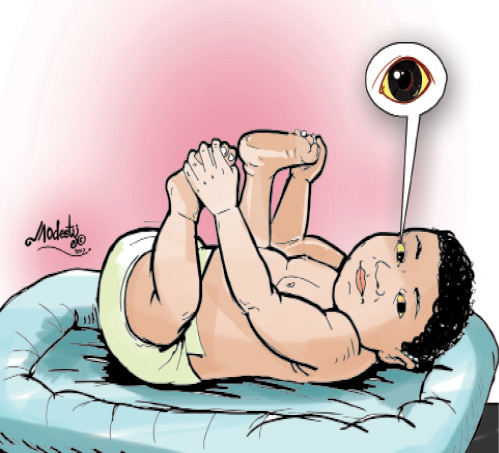My child is diagnosed with Retinoblastoma
Permit me a space in your respected and committed weekly column to ask about Retinoblastoma. My child in one of the foreign hospitals was diagnosed to be suffering from Retinoblastoma. Kindly provide simple information about this cancer to help us understand better. Mrs C X. Thanks for your question and wishing your child speedy recovery. […]

Permit me a space in your respected and committed weekly column to ask about Retinoblastoma. My child in one of the foreign hospitals was diagnosed to be suffering from Retinoblastoma. Kindly provide simple information about this cancer to help us understand better.
Mrs C X.
Thanks for your question and wishing your child speedy recovery. According to cancer experts, Retinoblastoma is an eye cancer that begins in the retina, the sensitive lining on the inside of our eyes. Retinoblastoma most commonly affects young children but can rarely occur in adults.
Retina is made up of nerve tissue that senses light as it comes through the front of our eyes. The retina sends signals through our optic nerves to our brain, where these signals are interpreted as images. A rare form of eye cancer, retinoblastoma is the most common form of cancer affecting the eye in children. Retinoblastoma may occur in one or both eyes.
What are the symptoms?
- A white color in the center circle of the eye (pupil) when light is shone in the eye, such as when taking a flash photograph
- Eyes that appear to be looking in different directions
- Eye redness
- Eye swelling
What are the causes?
- Retinoblastoma occurs when nerve cells in the retina develop genetic mutations. These mutations cause the cells to continue growing and multiplying when healthy cells would die. This accumulating mass of cells forms a tumor.
Retinoblastoma cells can invade further into the eye and nearby structures. Retinoblastoma can also spread (metastasize) to other areas of the body, including the brain and spine.
- In most cases, it is not clear what causes the genetic mutations that lead to retinoblastoma. However, it is possible for children to inherit a genetic mutation from their parents.
- Children with the inherited form of retinoblastoma tend to develop the disease at an earlier age. Hereditary retinoblastoma also tends to occur in both eyes, as opposed to just one eye.
How to prevent Retinoblastoma?
In most cases, what causes retinoblastoma isnot known. However, families with inherited retinoblastoma, genetic testing enables them to know which children have an increased risk of retinoblastoma, so eye exams can begin at an early age, when the tumor is small and a chance for a cure and preservation of vision is still possible.
How to make diagnosis?
- Eye exam to determine what is causing a child’s signs and symptoms.
- Imaging tests. Scans and other imaging tests can help to know whether retinoblastoma has grown to affect other structures around the eye. Imaging tests may include ultrasound, computerized tomography (CT) scan and magnetic resonance imaging (MRI), among others.
What are the treatment options?
The best treatments for a child’s retinoblastoma depend on the size and location of the tumor, whether cancer has spread to areas other than the eye and a child’s overall health.
- Chemotherapy is a drug treatment that uses chemicals to kill cancer cells. Chemotherapy can be taken in pill form or given through a blood vessel. In children with retinoblastoma, chemotherapy may help shrink a tumor so that another treatment, such as radiation therapy, cryotherapy, or laser therapy, may be used to treat the remaining cancer cells.
Radiation therapy uses high-energy beams, such as X-rays and protons, to kill cancer cells. Two types of radiation therapy used in treating retinoblastoma include: Internal radiation (brachytherapy) and External beam radiation.
- Cryotherapy uses extreme cold to kill cancer cells. During cryotherapy, a very cold substance, such as liquid nitrogen, is placed in or near the cancer cells.
- Surgery. When the tumor is too large to be treated by other methods, surgery may be used to treat retinoblastoma. Surgery to remove the eye may help prevent the spread of cancer to other parts of the body. Surgery for retinoblastoma includes: Surgery to remove the affected eye (enucleation) OR Surgery to place an eye implant OR Fitting an artificial eye.
